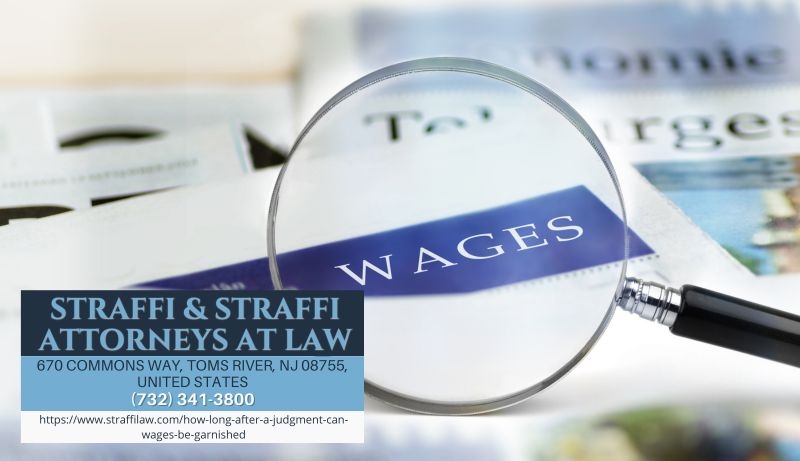New Jersey bankruptcy lawyer Daniel Straffi (https://www.straffilaw.com/how-long-after-a-judgment-can-wages-be-garnished) of Straffi & Straffi Attorneys at Law is shedding light on the complicated process of wage garnishment following a court judgment. For individuals across the state struggling with debt-related stress, understanding how and when wages may be garnished is a critical step in protecting their financial stability. Daniel Straffi, a seasoned New Jersey bankruptcy lawyer, emphasizes the importance of knowing one’s rights and the legal procedures involved in the garnishment process.
When a court judgment is issued against an individual, creditors may seek repayment by requesting wage garnishment—an action that can deeply affect a person's financial security. According to New Jersey bankruptcy lawyer Daniel Straffi, “Wage garnishment is more than just a legal issue—it has a direct impact on a person’s day-to-day life and their ability to meet essential expenses.” With over two decades of experience, Straffi has helped guide individuals through the complexities of wage garnishment laws in New Jersey, giving them clarity on timelines and the options available to manage their debt.
In New Jersey, wage garnishment is legally regulated and begins after a creditor obtains a judgment against the debtor. A court must then issue a writ of garnishment, which authorizes an employer to withhold a portion of the debtor’s wages. As a New Jersey bankruptcy lawyer, Daniel Straffi helps clients understand how this process unfolds—from the moment a lawsuit is filed to when the employer begins deducting wages from a paycheck. Typically, garnishment doesn’t begin immediately after judgment. It can take several months of debt collection activity and legal proceedings before the garnishment order is actually enforced.
Wage garnishment in New Jersey differs from federal rules in several important ways. State laws impose stricter limitations, especially to protect individuals from being left without the resources necessary to cover basic living costs. For example, under New Jersey law, only 10% of a person’s wages may be garnished if their income is under 250% of the federal poverty level. Daniel Straffi provides vital assistance to clients navigating these state-specific protections, helping them determine whether their income is exempt or if their garnishment amount is being calculated incorrectly.
The types of debt that may lead to wage garnishment also vary in priority. Child support and alimony claims are prioritized and can result in up to 60% of disposable income being garnished. Tax debts come next, often requiring no court order, while consumer debts such as credit cards or medical bills must go through the judgment process. Daniel Straffi explains to clients which type of debt they are dealing with and the likely legal consequences based on that classification.
Another important consideration in New Jersey’s garnishment law is the role of employers. Employers are legally required to act upon a garnishment order, inform the employee, and begin the deduction process. Failure to comply can result in serious penalties for the employer. As a New Jersey bankruptcy lawyer, Daniel Straffi also advises business owners on how to correctly follow these legal responsibilities to avoid liability.
Bankruptcy remains a strong legal tool to stop wage garnishment. Once a bankruptcy case is filed, an automatic stay goes into effect, pausing all collection activity, including garnishment. Daniel Straffi helps clients determine whether filing for Chapter 7 or Chapter 13 bankruptcy is a viable solution for their financial circumstances. Not all debts are dischargeable through bankruptcy—for example, child support payments typically continue regardless of filing—but it can provide essential relief for many struggling individuals.
Wage garnishment can be delayed or stopped entirely by challenging the order. If a debtor believes the garnishment is incorrect or that their income should be exempt, they can file a motion with the court. Daniel Straffi works with clients to assess whether such a challenge is appropriate and guides them through the legal filing process.
For those looking to avoid garnishment altogether, financial planning is key. Daniel Straffi encourages individuals to negotiate repayment plans with creditors early, keep accurate records of all financial activity, and seek legal advice when problems arise. These proactive steps can prevent court judgments and the resulting wage garnishment from ever taking place.
“Facing wage garnishment can be overwhelming, but understanding your rights and the legal process can make a significant difference,” says Daniel Straffi. “Whether through bankruptcy, contesting the order, or negotiating directly with creditors, there are often more options available than people realize.”
Wage garnishment can feel like a financial dead end, but with timely guidance and legal insight, individuals can regain control of their earnings and work toward a stable future. Daniel Straffi and the team at Straffi & Straffi Attorneys at Law are committed to helping New Jersey residents understand their legal standing, exercise their rights, and protect their financial well-being.
Those currently facing wage garnishment or at risk of judgment due to unresolved debt can benefit from consulting with Daniel Straffi. The first step toward financial clarity often begins with understanding the timeline, legal requirements, and personal options available under New Jersey law.
About Straffi & Straffi Attorneys at Law:
Straffi & Straffi Attorneys at Law serves clients across New Jersey in matters of bankruptcy, divorce, and criminal defense. Led by Daniel Straffi, Jr., the firm focuses on delivering legal guidance rooted in clarity, experience, and a commitment to client well-being. Daniel Straffi’s legal career spans over two decades and includes leadership roles such as Co-Chair of the Bankruptcy Panel of the Ocean County Bar Association.
Embeds:
Youtube Video: https://www.youtube.com/watch?v=wQ4m2QgBMt4
GMB: https://www.google.com/maps?cid=18340758732161592314
Email and website
Email: infodocuments@straffilaw.com
Website: https://www.straffilaw.com/
Media Contact
Company Name: Straffi & Straffi Attorneys at Law
Contact Person: Daniel Straffi
Email: Send Email
Phone: (732) 341-3800
Address:670 Commons Way
City: Toms River
State: New Jersey 08755
Country: United States
Website: https://www.straffilaw.com/







